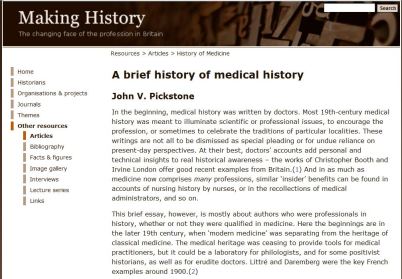A new term brings a new set of Wellcome Unit Seminars. This term they are on the theme of Medicine and Media, and are organised by Dr. Amelia Bonea and Dr. Cressida Jervis Read. The first one for this term is…
Week 1 – 20 January
Andy Williams, Cardiff University – Bad Science?: The Challenges of UK Specialist Reporting and the Future of Science, Health, and Environment News.
Science news is not formed in a social, economic, or cultural vacuum. It is written by people at news organisations which are cutting staff and investing fewer resources into news production than previously. Full discussions of science news in the UK must be situated in the context of the economic and political conditions under which that news is made. Drawing on the findings of an internet survey of UK science news journalists and 52 semi-structured interviews with specialist journalists and editors this talk will investigate elements of the political economy of UK specialist science, health and environment news journalism by assessing changes in the strength of this news beat over time and evaluating changes in working practices and working conditions among this group of news workers.
Dr Williams is currently a lecturer in JOMEC, having recently ended his RCUK Research Fellowship in Risk, Health and Science Communication. He has a number of research interests which intersect journalism studies and cultural studies.
His current major research interests relate to news sources and the influence of public relations on the UK media, especially in the area of science, health and environment news. He is also interested in the political economy of multiplatform journalism, the news in Wales, and in the rise of citizen journalism and user-generated content.
He is from the village of Llantwit Fardre in the South Wales valleys, and attended a local comprehensive school in nearby Beddau. He attained a first class degree in English Literature from Swansea University, and gained an MA and PhD at Cardiff University’s Centre for Critical and Cultural Theory, where his research interests were in poststructuralist cultural theory, UK media history, and the consumer culture of Victorian Britain.
After a stint as a political researcher for Leanne Wood AM (then the Shadow Social Justice Minister at the Welsh Assembly) he moved to the School of Journalism, Media and Cultural Studies in 2006.
He has a number of research interests which intersect journalism studies and cultural studies. His current major research interests relate to news sources and the influence of public relations on the UK media, especially in the area of science, health and environment news.
Selected Publications:
Murcott, T. and Williams, A. J. 2013. The challenges for science journalism in the UK. Progress in Physical Geography 37(2), pp. 152-160. (10.1177/0309133312471285)
Williams, A. J. and Gajevic, S. 2013. Selling science: Source struggles, public relations, and UK press coverage of animal–human hybrid embryos. Journalism Studies 14(4), pp. 507-522. (10.1080/1461670X.2012.718576)
Kitzinger, J. et al. 2008. Gender, stereotypes and expertise in the press: how newspapers represent female and male scientists.. Project Report. [Online]. UK Resource Centre for Women in Science, Engineering and Technology (UKRC) and Cardiff University. Available at: http://cf.ac.uk/jomec/resources/Kitzinger_Report_2.pd
The seminar will be held at 47 Banbury Road on Monday at 2.15pm prompt. Coffee will be available from 2pm



